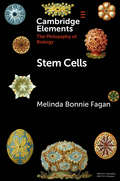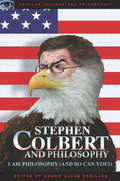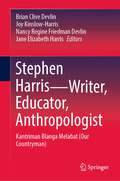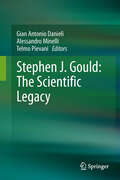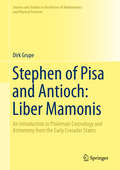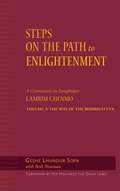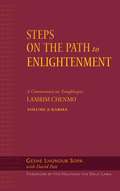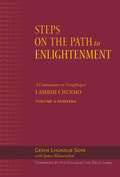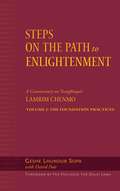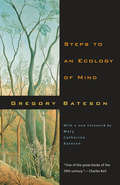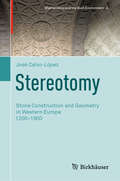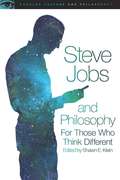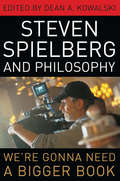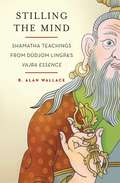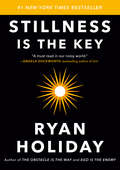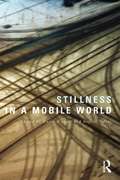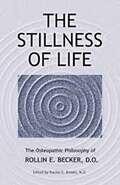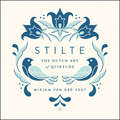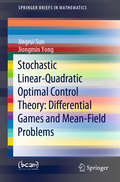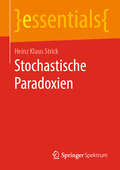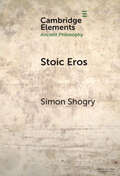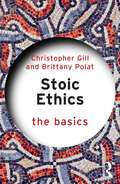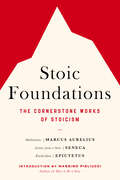- Table View
- List View
Stem Cells (Elements in the Philosophy of Biology)
by Melinda Bonnie FaganWhat is a stem cell? The answer is seemingly obvious: a cell that is also a stem, or point of origin, for something else. Upon closer examination, however, this combination of ideas leads directly to fundamental questions about biological development. A cell is a basic category of living thing; a fundamental 'unit of life.' A stem is a site of growth; an active source that supports or gives rise to something else. Both concepts are deeply rooted in biological thought, with rich and complex histories. The idea of a stem cell unites them, but the union is neither simple nor straightforward. This book traces the origins of the stem cell concept, its use in stem cell research today, and implications of the idea for stem cell experiments, their concrete results, and hoped-for clinical advances.
Stephen Colbert and Philosophy
by Aaron Allen SchillerAt the head of The Colbert Report, one of the most popular shows on television, Stephen Colbert is a pop culture phenomenon. More than one million people backed his fake candidacy in the 2008 U.S. presidential election on Facebook, a testament to the particularly rich set of issues and emotions Colbert brings to mind. Stephen Colbert and Philosophy is crammed with thoughtful and amusing chapters, each written by a philosopher and all focused on Colbert's inimitable reality - from his word creations (truthiness, wikiality, freem, and others) to his position as a faux-pundit who openly mocks Fox News and CNN. Although most of the discussion is centered around The Colbert Report, this collection does not neglect either his best-selling book, I Am America (And So Can You!), or his public performances, including his incendiary 2006 White House Press Correspondents' Dinner speech.
Stephen Harris—Writer, Educator, Anthropologist: Kantriman Blanga Melabat (Our Countryman)
by Brian Clive Devlin Nancy Regine Friedman Devlin Joy Kinslow-Harris Jane Elizabeth HarrisThis book documents the impact of Stephen Harris’s works in Aboriginal education, Aboriginal learning styles, domains of language use and bilingual-bicultural education. It provides a summary and critique of Stephen Harris's key ideas, particularly those on bilingual-bicultural education. This book also profiles the man, his background, his beliefs and talents. It showcases contributions and personal reflections from Stephen’s family, wife, close colleagues, and many of those influenced by his work. This festschrift explores the professional life and work of Stephen Harris as an educator and anthropologist who worked in the Northern Territory of Australia.
Stephen J. Gould: The Scientific Legacy
by Alessandro Minelli Telmo Pievani Gian Antonio DanieliStephen J. Gould's greatest contribution to science is a revised version of the theory of evolution which offers today a useful framework for understanding progress in many evolutionary fields. His intuitions about the conjunction of evolution and development, the role of ecological factors in speciation, the multi-level interpretation of the units of selection, and the interplay between functional pressures and constraints all represent fruitful lines of experimental research. His opposition to the progressive representations of evolution, the gene-centered view of natural history, or the adaptationist "just-so stories" has also left its mark on current biology. In May 2012, at the Istituto Veneto di Scienze, Lettere ed Arti in Venice, an international panel of scientists and philosophers discussed Stephen J. Gould's legacy, ten years after his death. This book presents a selection of those contributions, chosen for their interest and importance. A broad range of themes are covered: Gould's contribution to evolutionary theory, including the concept of punctuated equilibria and the importance of his pluralism; the Gouldian view of genome and development; Gould's legacy in anthropology; and, finally, the significance of his thought for the human sciences. This book provides a fascinating appraisal of the cultural legacy of one of the world's greatest popular writers in the life sciences. This is the first time that scientists including some of Gould's personal friends and co-authors of papers of momentous importance such as Niles Eldredge have come together to strike a balanced view of Gould's intellectual heritage.
Stephen of Pisa and Antioch: An Introduction to Ptolemaic Cosmology and Astronomy from the Early Crusader States (Sources and Studies in the History of Mathematics and Physical Sciences)
by Dirk GrupeThis volume aims to make Stephen of Pisa and Antioch’s work on the celestial sciences accessible to a wider readership, providing not just the text but a translation and introduction as well. The edition is based on the only known manuscript of the Liber Mamonis, MS Cambrai, Médiathèque d’Agglomération, A 930. It is split into two parts: the first provides an extensive introduction to Stephen and his work, while the second features the edition and translation. A comprehensive glossary and collection of photographs of plates are also included.
Steps on the Path to Enlightenment
by His Holiness the Dalai Lama Beth Newman Geshe Lhundub Sopa David PattSteps on the Path to Englightenment: The Foundation Practices marks the first volume of a much-anticipated, comprehensive commentary on the Lamrim Chenmo by the renowned Buddhist scholar, Geshe Sopa. This landmark commentary on what is perhaps the most elegant Tibetan presentation of the Buddhist path offers a detailed overview of Buddhist philosophy, especially invaluable to those wanting to enact the wisdom of the Buddha in their lives. In the Lamrim Chenmo, Tsongkhapa explains the path in terms of the three levels of practitioners: those of small capacity who seek happiness in future lives, those of medium capacity who seek liberation from the cycle of suffering, and those of great capacity who seek full enlightenment in order to benefit all beings. This volume covers the topics common to the first level: Tsongkhapa's explanations of the role of the teacher, his exhortation to take the essence of human existence, the contemplation of death and future lives, and going for the refuge. Given his vast knowledge and his experience in both Tibetan and Western contexts, Geshe Sopa is the ideal commentator of this work for the modern student of Tibetan Buddhism.
Steps on the Path to Enlightenment
by His Holiness the Dalai Lama Geshe Lhundub Sopa David PattThis second volume of the five-volume commentary by the renowned Buddhist scholar Geshe Lhundub Sopa focuses on the key Buddhist concepts of karma, or cause and effect, and dependent origination. Considered one of the finest living Buddhist scholars, Geshe Sopa provides commentaries essential for anyone interested in a sound understanding of Tibetan Buddhist practice and philosophy. Never has a book gone into such clear detail on karma and dependent origination--concepts which, despite many references in contemporary culture, are too often misunderstood. Here, Geshe Sopa starts from the beginning with a faithful reading of the Lamrim Chenmo and, in the end, leaves readers with the proper tools for incorporating core Buddhist concepts into their study, teaching, and practice.
Steps on the Path to Enlightenment
by Geshe Lhundub Sopa James BlumenthalAn exploration of the practice of samatha, the style of meditation devoted to focus and attentionGeshe Sopa continues his elucidation of Lama Tsongkhapa's masterwork on the Buddhist path with an explanation of the core meditative practice of samatha, or calm abiding. Showing how it is absolutely essential for--and goes hand in hand with--the achievement of insight into reality, he gives practical tips for countering sleepiness, agitation, and their more subtle counterparts. Leading us step by step toward deeper levels of concentration, volume 4 of the Steps on the Path to Enlightenment series brings readers closer to the ultimate goal of samatha: unlimited and effortless focus.
Steps on the Path to Enlightenment: The Foundation Practices
by His Holiness the Dalai Lama Beth Newman Geshe Lhundub Sopa David PattSteps on the Path to Englightenment: The Foundation Practices marks the first volume of a much-anticipated, comprehensive commentary on the Lamrim Chenmo by the renowned Buddhist scholar, Geshe Sopa. This landmark commentary on what is perhaps the most elegant Tibetan presentation of the Buddhist path offers a detailed overview of Buddhist philosophy, especially invaluable to those wanting to enact the wisdom of the Buddha in their lives. In the Lamrim Chenmo, Tsongkhapa explains the path in terms of the three levels of practitioners: those of small capacity who seek happiness in future lives, those of medium capacity who seek liberation from the cycle of suffering, and those of great capacity who seek full enlightenment in order to benefit all beings. This volume covers the topics common to the first level: Tsongkhapa's explanations of the role of the teacher, his exhortation to take the essence of human existence, the contemplation of death and future lives, and going for the refuge. Given his vast knowledge and his experience in both Tibetan and Western contexts, Geshe Sopa is the ideal commentator of this work for the modern student of Tibetan Buddhism.
Steps to an Ecology of Mind
by Gregory BatesonGregory Bateson was a philosopher, anthropologist, photographer, naturalist, and poet, as well as the husband and collaborator of Margaret Mead. With a new foreword by his daughter Mary Katherine Bateson, this classic anthology of his major work will continue to delight and inform generations of readers. "This collection amounts to a retrospective exhibition of a working life. . . . Bateson has come to this position during a career that carried him not only into anthropology, for which he was first trained, but into psychiatry, genetics, and communication theory. . . . He . . . examines the nature of the mind, seeing it not as a nebulous something, somehow lodged somewhere in the body of each man, but as a network of interactions relating the individual with his society and his species and with the universe at large. "—D. W. Harding, New York Review of Books "[Bateson's] view of the world, of science, of culture, and of man is vast and challenging. His efforts at synthesis are tantalizingly and cryptically suggestive. . . . This is a book we should all read and ponder. "—Roger Keesing, American Anthropologist Gregory Bateson (1904-1980) was the author of Naven and Mind and Nature.
Stereotomy: Stone Construction and Geometry in Western Europe 1200–1900 (Mathematics and the Built Environment #4)
by José Calvo-LópezThis book deals with the general concepts in stereotomy and its connection with descriptive geometry, the social background of its practitioners and theoreticians, the general methods and tools of this technology, and the specific procedures for the members built in hewn stone, including arches, squinches, stairs and vaults, ending with a chapter discussing the open problems in this field. Thus, it can be used as a reference book in the subject, but it can also read as a compelling narrative on this subject, one of the main branches of pre-industrial technology. Construction in hewn stone requires the use of geometrical methods and tools to assure that individual stones, either blocks or voussoirs, fit with one another and conform to the general shape of walls, arches or vaults. During the Late Middle Ages and the Renaissance, such techniques and instruments were developed empirically by masons and architects. Later on, learned mathematicians and engineers introduced refinements in these procedures and this branch of knowledge, known as stereotomy, furnished much material to descriptive geometry, a science born with the French Revolution which provided the foundation for projective geometry.
Steve Jobs and Philosophy
by Shawn E. KleinIn Steve Jobs and Philosophy sixteen philosophers take a close look at the inspiring yet often baffling world of Steve Jobs. What can we learn about business ethics from the example of Jobs? What are the major virtues of a creative innovator?<P><P> How could Jobs successfully defy and challenge conventional business practices? How did Jobs combine values and attitudes previously believed to be unmixable? What does it really mean to "think different"? Can entrepreneurs be made or are they just born? If Jobs didn't make any major inventions, just what was his contribution? How is Jobs's life illuminated by Buddhism? How does a counter-culture transform mainstream culture? What does Jobs teach us about the notions of simplicity and functionality in design? How do Jobs's achievements alter the way we think about technology in relation to human life? The chapters cover vital issues in ethics, business, aesthetics, and technology. They are followed by a fascinating appendix listing all the philosophers mentioned in the book, along with explanations of their lives and key themes in their thoughts. Steve Jobs and Philosophy is aimed at readers interested Jobs himself, in entrepreneurship, in technology, culture, and values.
Steven Spielberg and Philosophy: We're Gonna Need a Bigger Book (The Philosophy of Popular Culture #Ppcs)
by Dean A. Kowalski&“This lively collection of essays on the ideas underpinning his films enriches and enlarges our understanding of Spielberg&’s complex body of work.&” —Joseph McBride, author of Steven Spielberg: A Biography Few directors have had as powerful an influence on the film industry and the movie-going public as Steven Spielberg. Whatever the subject—dinosaurs, war, extra-terrestrials, slavery, the Holocaust, or terrorism—one clear and consistent touchstone is present in all of Spielberg&’s films: an interest in the human condition. In movies ranging from Jaws to Schindler&’s List to Amistad to Jurassic Park, he has brought to life some of the most popular heroes—and most despised villains—of all time. In Steven Spielberg and Philosophy, Dean A. Kowalski and some of the nation&’s most respected philosophers investigate Spielberg&’s art to illuminate the nature of humanity. The book explores rich themes such as cinematic realism, fictional belief, terrorism, family ethics, consciousness, virtue and moral character, human rights, and religion in Spielberg&’s work. Avid moviegoers and deep thinkers will discover plenty to enjoy in this collection.
Stiegler for Architects (Thinkers for Architects)
by David CapenerIn the late 1970s Bernard Stiegler was arrested for armed robbery and imprisoned. Whilst on hunger strike he was given his own cell where, in solitude, he began to study philosophy until his release in 1983. By 1993, under the supervision of Jacques Derrida, he completed his PhD, which was published a year later as Volume 1 of the Technics and Time series. Stiegler went on to become one of the most influential philosophers of the twenty-first century.Stiegler for Architects is the first introduction to the key concepts and ideas of Bernard Stiegler that are relevant to architects. The book asks to what extent it might be possible to have a right to the city in our age of contemporary algorithmic technology. The book begins with a hypothesis: The philosophy of Bernard Stiegler provides an adequate methodology by which we might understand the effects of contemporary digital technology. Second, the fundamental basis of Stiegler’s philosophy is introduced—human evolution is not possible apart from technology. Third, the book introduces how his work might be used to think about the city in our contemporary technological age.The book concludes that the question of the extent to which the right to the city is possible in our contemporary technological age is a question of the extent to which it is possible to prescribe a therapeutics that is capable of being a cure—one that acts across the multiple scales upon which algorithmic technologies operate. This book is essential reading for any architect or designer who is interested in how contemporary digital technology affects everyday life in the city, or anyone wrestling with Stiegler’s ideas.
Stilling the Mind
by B. Alan Wallace Brian HodelIn his previous book, The Attention Revolution, bestselling author Alan Wallace guided readers through the stages of shamatha, a meditation for focusing the mind. In Stilling the Mind, he uses the wisdom of Dzogchen--the highest of all the meditation traditions--to open up the shamatha practice into a space of vast freedom. Here, Wallace introduces us to Dudjom Lingpa's Vajra Essence, one of the most cherished works of the Nyingma school from which Dzogchen stems. With his trademark enthusiasm and keen intelligence, Wallace makes obscure concepts intelligible to contemporary readers and allows us to glimpse the profound realizations of a great nineteenth-century spiritual adept.
Stillness Is the Key: A Boxed Set Of The Obstacle Is The Way, Ego Is The Enemy & Stillness Is The Key
by Ryan HolidayIn The Obstacle Is the Way and Ego Is the Enemy, bestselling author Ryan Holiday made ancient wisdom wildly popular with a new generation of leaders in sports, politics, and technology. In his new book, Stillness Is the Key, Holiday draws on timeless Stoic and Buddhist philosophy to show why slowing down is the secret weapon for those charging ahead.All great leaders, thinkers, artists, athletes, and visionaries share one indelible quality. It enables them to conquer their tempers. To avoid distraction and discover great insights. To achieve happiness and do the right thing. Ryan Holiday calls it stillness--to be steady while the world spins around you. In this book, he outlines a path for achieving this ancient, but urgently necessary way of living. Drawing on a wide range of history's greatest thinkers, from Confucius to Seneca, Marcus Aurelius to Thich Nhat Hanh, John Stuart Mill to Nietzsche, he argues that stillness is not mere inactivity, but the doorway to self-mastery, discipline, and focus.Holiday also examines figures who exemplified the power of stillness: baseball player Sadaharu Oh, whose study of Zen made him the greatest home run hitter of all time; Winston Churchill, who in balancing his busy public life with time spent laying bricks and painting at his Chartwell estate managed to save the world from annihilation in the process; Fred Rogers, who taught generations of children to see what was invisible to the eye; Anne Frank, whose journaling and love of nature guided her through unimaginable adversity. More than ever, people are overwhelmed. They face obstacles and egos and competition. Stillness Is the Key offers a simple but inspiring antidote to the stress of 24/7 news and social media. The stillness that we all seek is the path to meaning, contentment, and excellence in a world that needs more of it than ever.
Stillness in a Mobile World (International Library of Sociology)
by David Bissell Gillian FullerThis edited collection of essays on the conceptual, political and philosophical importance of stillness is positioned within a world that has increasingly come to be understood through the theoretical and conceptual lens of movement. With contributions from leading scholars in the field, the diversity of this collection illuminates the multiplicity of ontological and epistemological registers through which stillness moves: from human geography to media studies, cultural theory to fine arts. With the help of luminaries such as Deleuze, Bergson, Barthes and Beckett, this book interweaves cutting-edge theoretical insight with empirical illustrations which examine and traverse a multitude of practices, spaces and events. In an era where stasis, slowness and passivity are often held to be detrimental, this collection puts forward a new set of political and ethical concerns which help us to come to terms with, understand, and account for (im)mobile life. Stillness in a Mobile World in an essential source of reference for both undergraduate and post-graduate students working within disciplines such as cultural studies, sociology, mobility studies, and human geography.
Stillness of Life (The Osteopathic Philosophy of Rollin E. Becker, D. O. #Volume 2)
by Rollin Becker"Stillness of Life " is the second volume of Dr. Rollin E. Becker's work [and] serves as a companion to the previously published "Life in Motion"
Stilte: The Dutch Art of Quietude
by Mirjam van der VegtWe long for moments we can slow down and be still. Our days are often filled with too much noise, anxiety, and confusion. What do you do when your life isn&’t what you expected it to be? What can you do to slow it all down? Stilte encourages readers to focus on stillness and literal silence, creating space for moments of peace.Originally published in Dutch, Stilte reveals a grace-filled lifestyle. It shows practical ways for how to receive inner calmness and serenity. It brings you closer to the heart of yourself, other people, and God.
Stochastic Calculus with Infinitesimals
by Frederik S. HerzbergStochastic analysis is not only a thriving area of pure mathematics with intriguing connections to partial differential equations and differential geometry. It also has numerous applications in the natural and social sciences (for instance in financial mathematics or theoretical quantum mechanics) and therefore appears in physics and economics curricula as well. However, existing approaches to stochastic analysis either presuppose various concepts from measure theory and functional analysis or lack full mathematical rigour. This short book proposes to solve the dilemma: By adopting E. Nelson's "radically elementary" theory of continuous-time stochastic processes, it is based on a demonstrably consistent use of infinitesimals and thus permits a radically simplified, yet perfectly rigorous approach to stochastic calculus and its fascinating applications, some of which (notably the Black-Scholes theory of option pricing and the Feynman path integral) are also discussed in the book.
Stochastic Linear-Quadratic Optimal Control Theory: Differential Games and Mean-Field Problems (SpringerBriefs in Mathematics)
by Jingrui Sun Jiongmin YongThis book gathers the most essential results, including recent ones, on linear-quadratic optimal control problems, which represent an important aspect of stochastic control. It presents results for two-player differential games and mean-field optimal control problems in the context of finite and infinite horizon problems, and discusses a number of new and interesting issues. Further, the book identifies, for the first time, the interconnections between the existence of open-loop and closed-loop Nash equilibria, solvability of the optimality system, and solvability of the associated Riccati equation, and also explores the open-loop solvability of mean-filed linear-quadratic optimal control problems. Although the content is largely self-contained, readers should have a basic grasp of linear algebra, functional analysis and stochastic ordinary differential equations. The book is mainly intended for senior undergraduate and graduate students majoring in applied mathematics who are interested in stochastic control theory. However, it will also appeal to researchers in other related areas, such as engineering, management, finance/economics and the social sciences.
Stochastische Paradoxien (essentials)
by Heinz Klaus StrickIn diesem essential beschreibt Heinz Klaus Strick anhand von zahlreichen Beispielen aus verschiedenen Teilgebieten der Wahrscheinlichkeitsrechnung und Statistik, warum es bei stochastischen Fragestellungen immer wieder dazu kommt, dass Aussagen über Wahrscheinlichkeiten paradox erscheinen, also scheinbar im Widerspruch zu den eigenen Vorstellungen über Zufallsvorgänge stehen. Dabei stellt sich heraus, dass es sich in solchen Fällen oft nur um die Verwechslung von Wahrscheinlichkeiten oder um falsche Modellierungen von zufallsbedingten Vorgängen handelt. Nach der Lektüre des essentials werden der Leserin/dem Leser mit Sicherheit manche Phänomene nicht mehr „paradox“ vorkommen.
Stoic Eros (Elements in Ancient Philosophy)
by Simon ShogryThe Stoics distinguish two forms of eros. In vicious agents eros is indeed a passion and thus born out of a defective rational judgment about what is needed for happiness. But there is also a positive form of erotic love, practiced by the Sage on the basis of knowledge, which aims to reproduce his virtuous condition in others. In this Element, the author shows how the Stoics' wider theoretical commitments in ethics, epistemology, aesthetics, and psychology support their duplex account of eros. They also consider the influence of Plato's Symposium on the Stoic account, arguing for hitherto unrecognized links with Socratic moral psychology. The Element concludes with an assessment of how the Stoic erotic ideal fares in relation to our intuitions about the non-egoistic and particularized nature of love.
Stoic Ethics: The Basics (The Basics)
by Christopher Gill Brittany PolatAt a time of unprecedented interest in Stoicism, this book offers a comprehensive introduction to Stoic ethics for students and for readers interested in Stoic life-guidance.It combines an explanation of the main philosophical ideas in ancient Stoic ethics by Christopher Gill with discussion of how to put these ideas into practice in our own lives by Brittany Polat.The first seven chapters examine central Stoic ethical claims and the questions raised by their claims, including: Why does our happiness in life depend solely on virtue? Is ethics grounded on nature; and, if so, does this mean human nature or the natural world? What is the connection between gaining ethical understanding and relating properly to other people? What counts as right action and how do we learn to make good decisions? What is the proper place of emotion in the good life? The two final chapters discuss the significance of these Stoic ideas for modern thought, especially for virtue ethics and environmental ethics, and the Stoic contribution to guidance on living.With a glossary of key terms and suggestions for further reading, Stoic Ethics: The Basics is an ideal starting point for anyone looking for an accessible and lively explanation of Stoic ideas and their implications for practical living.
Stoic Foundations: The Cornerstone Works of Stoicism
by Epictetus Marcus Aurelius SenecaAn essential guide to the core texts of Stoic philosophy, featuring a new introduction from Massimo Pigliucci, author of How To Be A Stoic Stoicism is a philosophy, a worldview, and a transformational practice. Throughout the centuries everyone from kings and presidents to Silicone Valley entrepreneurs have drawn inspiration and wisdom from Stoicism. The best way to learn about Stoic philosophy is always to go back to the foundation—the original texts, written by the great Stoic philosophers. Three writers form the bedrock of Stoic thought: Marcus Aurelius, a Roman Emperor; Seneca, a playwright and advisor; and Epictetus, a former slave turned philosopher and teacher. Stoic Foundations combines the work of these three pillars of Stoic thought into one essential volume, including Marcus Aurelius&’s Meditations, selections from Seneca&’s Letters from a Stoic, and Epictetus&’s Enchiridion. Though they were written millennia ago, these texts have resonated with readers across the centuries, offering powerful, clear guidance that remains relevant and transformative in the modern day. Featuring an insightful introduction from Massimo Pigliucci, author of How to Be A Stoic, Stoic Foundations is essential reading for anyone interested in exploring modern Stoicism and in reading the luminaries of Stoic philosophy in their own words.
